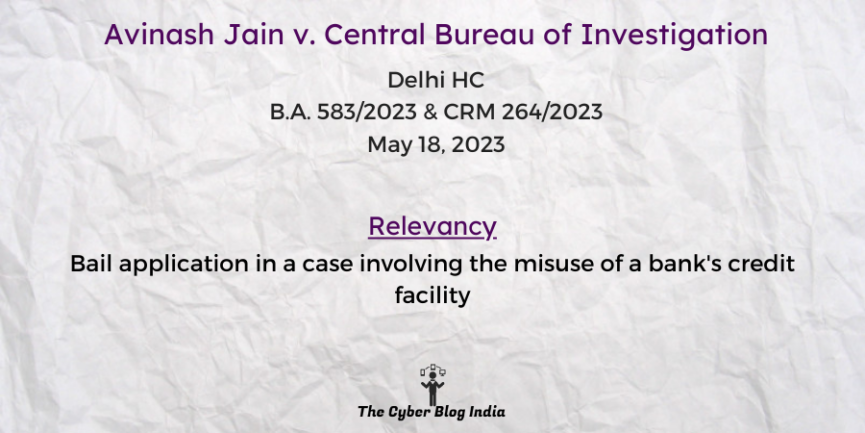Avinash Jain v. CBI

Avinash Jain v. Central Bureau of Investigation
In the High Court of Delhi
B.A. 583/2023 & CRM 264/2023
Before Justice Amit Sharma
Decided on May 18, 2023
Relevancy of the case: Bail application in a case involving the misuse of a bank’s credit facility
Statutes and Provisions Involved
- The Information Technology Act, 2000 (Section 66)
- The Indian Penal Code, 1860 (Section 120B, 420, 468, 471)
- The Code of Criminal Procedure, 1973 (Section 93, 157(1), 173(2), 167(2), 439, 482)
- The Prevention of Corruption Act, 1988 (Section 17A, 13(1)(d), 13(2))
Relevant Facts of the Case
- The Deputy General Manager of SBI filed an FIR alleging that Arise India Ltd. and its directors, including the present applicant, misused the bank’s credit facilities. SBI had declared the account a ‘fraud’.
- The police arrested the applicant and remanded him to judicial custody, whilst the CBI filed a chargesheet indicating further investigation.
- The applicant applied for default bail, but the Special Judge dismissed it. This decision was based on the fact that the right to statutory bail was defeated once the chargesheet was filed within the stipulated time.
Prominent Arguments by the Advocates
The applicant’s counsel:
- The CBI carried out a rather piecemeal investigation. It only exhibits only five out of eleven allegations. Hence, the chargesheet is incomplete. Therefore, the applicant can exercise his right to default bail.
- The Principal Sessions Judge at the Rouve Avenue District Court observed that the CBI should not have filed the chargesheet without completing the investigation.
- Moreover, seeking sanction under Section 17A of the Prevention of Corruption Act, 1988, is delayed by 25 months. This indicates unfair investigation practices.
The respondent’s counsel:
- The CBI’s chargesheet is sufficient for the court to take cognisance. Since the agency had not identified the public official, the investigation could continue without requiring approval under Section 17. As the offences mentioned in the FIR were punishable for up to seven years, the agency filed the chargesheet within the stipulated time of 60 days.
Opinion of the Bench
- The chargesheet filed on April 21, 2022, only pertains to a portion of the offences. The agency was still investigating other offences. Hence, the magistrate cannot take cognisance of the case under Section 309 of the Code of Criminal Procedure, 1973.
- Filing an incomplete chargesheet to circumvent the statutory bail provisions under Section 167(2) is not permissible. It negates the indefeasible right to bail.
- There is a clear difference between the completion of an investigation and its furtherance.
- Since the agency had not completed the investigation, their report under Section 173(8) is not justifiable.
Final Decision
- The bench granted bail to the petitioner with conditions.
Kashish Saxena, an undergraduate student at National Law University, Jodhpur, and Prachi Chakravarty, an undergraduate student at University Law College, Bangalore University, prepared this case summary during their internship with The Cyber Blog India in May/June 2024.
